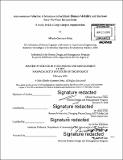| dc.contributor.advisor | Ryan Chin and Sertac Karaman. | en_US |
| dc.contributor.author | Guerrero Ortiz, Alfredo | en_US |
| dc.contributor.other | Massachusetts Institute of Technology. Engineering Systems Division. | en_US |
| dc.date.accessioned | 2017-01-06T16:13:48Z | |
| dc.date.available | 2017-01-06T16:13:48Z | |
| dc.date.copyright | 2016 | en_US |
| dc.date.issued | 2016 | en_US |
| dc.identifier.uri | http://hdl.handle.net/1721.1/106249 | |
| dc.description | Thesis: S.M. in Engineering and Management, Massachusetts Institute of Technology, School of Engineering, System Design and Management Program, Engineering and Management Program, 2016. | en_US |
| dc.description | Cataloged from PDF version of thesis. | en_US |
| dc.description | Includes bibliographical references (pages 70-72). | en_US |
| dc.description.abstract | The world is and has been in constant change. Disruptive technologies have emerged and integrated into our day to day lives and have radically improved the way we live. Today, in our overly connected world technology is advancing at an incredible fast pace, firms have to change focus to keep up with the shift in the consumer behavior, megacities will continue to emerge; at the same time consciousness is growing towards more efficient and ecological solutions to solve the problems the world is facing what is leading to the redefinition of economic models. The automotive industry in particular is being disrupted to become mobility services companies instead of car makers. With the unquestionable need of people interacting with each other and the imminent need for innovation for any firm to subsist, the next step is to identify the best way the organization can foster interactions and communication between individuals where they are able to continuously innovate to achieve the substantially higher performance every organization is seeking for. Although Autonomous Vehicles are close to a production phase, there are still limitations to their deployment in the full ecosystem. This thesis provides a systems perspective approach by studying a large campus organization and offering a proposal to integrate Autonomous Vehicles technologies with the purpose of increasing face-to-face interactions while at the same time increasing productivity, innovation, and creativity to improve people's lives by facilitating human mobility staging a unique mobility experience. | en_US |
| dc.description.statementofresponsibility | by Alfredo Guerrero Ortiz. | en_US |
| dc.format.extent | 72 pages | en_US |
| dc.language.iso | eng | en_US |
| dc.publisher | Massachusetts Institute of Technology | en_US |
| dc.rights | M.I.T. theses are protected by copyright. They may be viewed from this source for any purpose, but reproduction or distribution in any format is prohibited without written permission. See provided URL for inquiries about permission. | en_US |
| dc.rights.uri | http://dspace.mit.edu/handle/1721.1/7582 | en_US |
| dc.subject | Engineering and Management Program. | en_US |
| dc.subject | System Design and Management Program. | en_US |
| dc.subject | Engineering Systems Division. | en_US |
| dc.title | Autonomous vehicles : a solution to facilitate human mobility and increase face-to-face interactions : a study inside a large campus organization | en_US |
| dc.type | Thesis | en_US |
| dc.description.degree | S.M. in Engineering and Management | en_US |
| dc.contributor.department | Massachusetts Institute of Technology. Engineering and Management Program | en_US |
| dc.contributor.department | System Design and Management Program. | en_US |
| dc.identifier.oclc | 961924211 | en_US |
